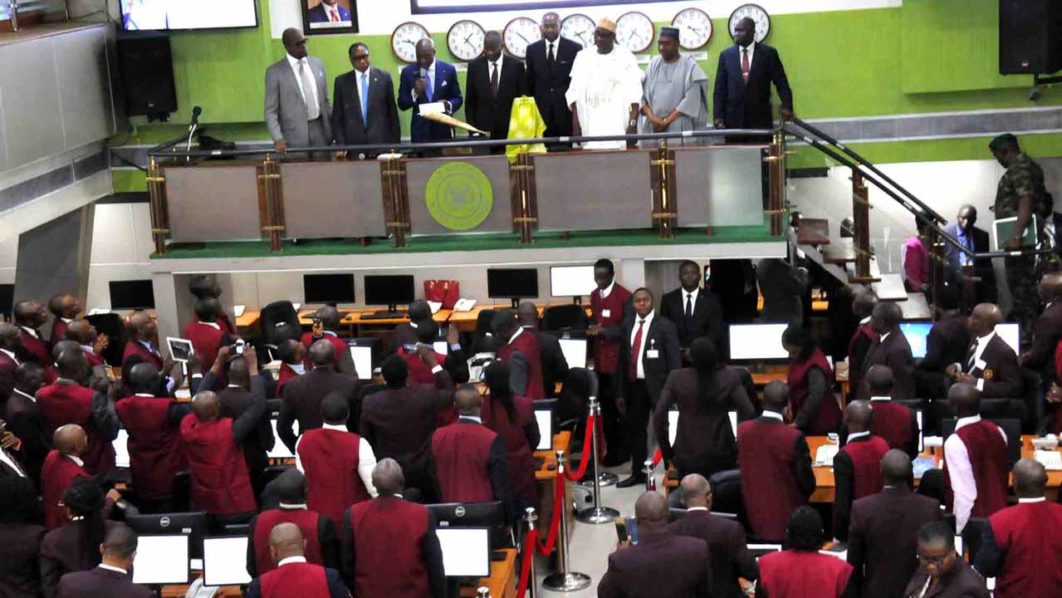 |
| Nigerian Stock Exchange (NSE) |
The Nigerian Stock Exchange (NSE) has announced the review of the NSE-30 and the seven sectoral indices effective Jan. 1, 2018.
The exchange in a statement signed by Mr Olumide Orojimi, Head, Corporate Communications, said that the composition of these indices would be announced in January, after the completion of the year-end review and index rebalancing exercise.
Orojimi said that the exercise would see the entry of some major companies and the exit of others from the various indices.
He said that the seven indices were NSE Consumer Goods, NSE Banking, NSE Insurance, NSE Industrial, NSE Oil & Gas, NSE Pension and the NSE Lotus Islamic Indices.
Orojimi said that the indices, which were developed using the market capitalisation methodology, were rebalanced on a bi-annual basis, on the first business day in January and in July.
He said that under the consumer goods index, Northern Nigeria Flour Mills had been granted entry into the indices, while Seven Up was on the exiting side.
Orojimi added that Equity Assurance and Mutual Benefit Assurance was considered for entry into the NSE insurance index, while Regency Alliance and Universal Insurance would exit the index.
“Oando is exiting on the NSE Oil and Gas indices, making way for Eterna Oil to enter into the index.
For the NSE Pension index, Honeywell flourmills and International Breweries would be given access to the index, while Oando and Seven –Up are leaving the index,’’ he said.
Orojimi said that the stocks were also selected based on market capitalisation and liquidity, noting that liquidity was based on the number of days the stock was traded during the preceding two quarters.
“To be included in the index, the stock must have traded for at least 70 per cent of the number of trading days in the preceding two quarters,’’ he said.
The News Agency of Nigeria (NAN) reports that the exchange began publishing the NSE 30 Index in February 2009, with index values available from Jan. 1, 2007.
The exchange on July 1, 2008, developed four sectoral indices and one index in 2013, with a base value of 1,000 points, designed to provide investable benchmarks to capture the performance of specific sectors.
The Insurance and Consumer Goods sector index is comprised of the 15 most capitalised and liquid companies; the Banking and Industrial Goods sector index, comprised of 10 most capitalised and liquid companies.
The Oil & Gas sector index, is comprised the seven most capitalised and liquid companies. (NAN)
In this article:
The exchange in a statement signed by Mr Olumide Orojimi, Head, Corporate Communications, said that the composition of these indices would be announced in January, after the completion of the year-end review and index rebalancing exercise.
Orojimi said that the exercise would see the entry of some major companies and the exit of others from the various indices.
He said that the seven indices were NSE Consumer Goods, NSE Banking, NSE Insurance, NSE Industrial, NSE Oil & Gas, NSE Pension and the NSE Lotus Islamic Indices.
Orojimi said that the indices, which were developed using the market capitalisation methodology, were rebalanced on a bi-annual basis, on the first business day in January and in July.
He said that under the consumer goods index, Northern Nigeria Flour Mills had been granted entry into the indices, while Seven Up was on the exiting side.
Orojimi added that Equity Assurance and Mutual Benefit Assurance was considered for entry into the NSE insurance index, while Regency Alliance and Universal Insurance would exit the index.
“Oando is exiting on the NSE Oil and Gas indices, making way for Eterna Oil to enter into the index.
For the NSE Pension index, Honeywell flourmills and International Breweries would be given access to the index, while Oando and Seven –Up are leaving the index,’’ he said.
Orojimi said that the stocks were also selected based on market capitalisation and liquidity, noting that liquidity was based on the number of days the stock was traded during the preceding two quarters.
“To be included in the index, the stock must have traded for at least 70 per cent of the number of trading days in the preceding two quarters,’’ he said.
The News Agency of Nigeria (NAN) reports that the exchange began publishing the NSE 30 Index in February 2009, with index values available from Jan. 1, 2007.
The exchange on July 1, 2008, developed four sectoral indices and one index in 2013, with a base value of 1,000 points, designed to provide investable benchmarks to capture the performance of specific sectors.
The Insurance and Consumer Goods sector index is comprised of the 15 most capitalised and liquid companies; the Banking and Industrial Goods sector index, comprised of 10 most capitalised and liquid companies.
The Oil & Gas sector index, is comprised the seven most capitalised and liquid companies. (NAN)
In this article:
